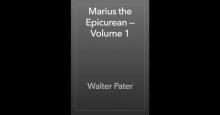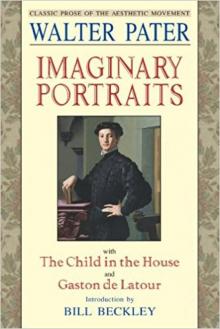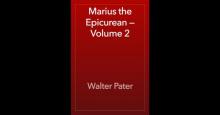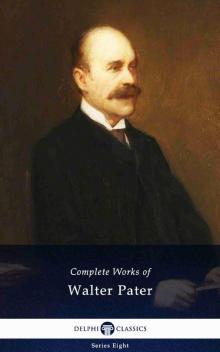- Home
- Walter Pater
Delphi Complete Works of Walter Pater Page 4
Delphi Complete Works of Walter Pater Read online
Page 4
On the last morning of his visit Marius entered the shrine again, and just before his departure the priest, who had been his special director during his stay at the place, lifting a cunningly contrived panel, which formed the back of one of the carved seats, bade him look through. What he saw was like the vision of a new world, by the opening of some unsuspected window in a familiar dwelling-place. He looked out upon a long-drawn valley of singularly cheerful aspect, hidden, by the peculiar conformation of the locality, from all points of observation but this. In a green meadow at the foot of the steep olive-clad rocks below, the novices were taking their exercise. The softly sloping sides of the vale lay alike in full sunlight; and its distant opening was closed by a beautifully formed mountain, from which the last wreaths of morning mist were rising under the heat. It might have seemed the very presentment of a land of hope, its hollows brimful of a shadow of blue flowers; and lo! on the one level space of the horizon, in a long dark line, were towers and a dome: and that was Pisa. — Or Rome, was it? asked Marius, ready to believe the utmost, in his excitement.
All this served, as he understood afterwards in retrospect, at once to strengthen and to purify a certain vein of character in him. Developing the ideal, pre-existent there, of a religious beauty, associated for the future with the exquisite splendour of the temple of Aesculapius, as it dawned upon him on that morning of his first visit — it developed that ideal in connexion with a vivid sense of the value of mental and bodily sanity. And this recognition of the beauty, even for the aesthetic sense, of mere bodily health, now acquired, operated afterwards as an influence morally salutary, counteracting the less desirable or hazardous tendencies of some phases of thought, through which he was to pass.
He came home brown with health to find the health of his mother failing; and about her death, which occurred not long afterwards, there was a circumstance which rested with him as the cruellest touch of all, in an event which for a time seemed to have taken the light out of the sunshine. She died away from home, but sent for him at the last, with a painful effort on her part, but to his great gratitude, pondering, as he always believed, that he might chance otherwise to look back all his life long upon a single fault with something like remorse, and find the burden a great one. For it happened that, through some sudden, incomprehensible petulance there had been an angry childish gesture, and a slighting word, at the very moment of her departure, actually for the last time. Remembering this he would ever afterwards pray to be saved from offences against his own affections; the thought of that marred parting having peculiar bitterness for one, who set so much store, both by principle and habit, on the sentiment of home.
CHAPTER IV: THE TREE OF KNOWLEDGE
O mare! O littus! verum secretumque Mouseion,
quam multa invenitis, quam multa dictatis!
Pliny’s Letters.
IT would hardly have been possible to feel more seriously than did Marius in those grave years of his early life. But the death of his mother turned seriousness of feeling into a matter of the intelligence: it made him a questioner; and, by bringing into full evidence to him the force of his affections and the probable importance of their place in his future, developed in him generally the more human and earthly elements of character. A singularly virile consciousness of the realities of life pronounced itself in him; still however as in the main a poetic apprehension, though united already with something of personal ambition and the instinct of self-assertion. There were days when he could suspect, though it was a suspicion he was careful at first to put from him, that that early, much cherished religion of the villa might come to count with him as but one form of poetic beauty, or of the ideal, in things; as but one voice, in a world where there were many voices it would be a moral weakness not to listen to. And yet this voice, through its forcible pre-occupation of his childish conscience, still seemed to make a claim of a quite exclusive character, defining itself as essentially one of but two possible leaders of his spirit, the other proposing to him unlimited self-expansion in a world of various sunshine. The contrast was so pronounced as to make the easy, light-hearted, unsuspecting exercise of himself, among the temptations of the new phase of life which had now begun, seem nothing less than a rival religion, a rival religious service. The temptations, the various sunshine, were those of the old town of Pisa, where Marius was now a tall schoolboy. Pisa was a place lying just far enough from home to make his rare visits to it in childhood seem like adventures, such as had never failed to supply new and refreshing impulses to the imagination. The partly decayed pensive town, which still had its commerce by sea, and its fashion at the bathing-season, had lent, at one time the vivid memory of its fair streets of marble, at another the solemn outline of the dark hills of Luna on its background, at another the living glances of its men and women, to the thickly gathering crowd of impressions, out of which his notion of the world was then forming. And while he learned that the object, the experience, as it will be known to memory, is really from first to last the chief point for consideration in the conduct of life, these things were feeding also the idealism constitutional with him — his innate and habitual longing for a world altogether fairer than that he saw. The child could find his way in thought along those streets of the old town, expecting duly the shrines at their corners, and their recurrent intervals of garden-courts, or side-views of distant sea. The great temple of the place, as he could remember it, on turning back once for a last look from an angle of his homeward road, counting its tall gray columns between the blue of the bay and the blue fields of blossoming flax beyond; the harbour and its lights; the foreign ships lying there; the sailors’ chapel of Venus, and her gilded image, hung with votive gifts; the seamen themselves, their women and children, who had a whole peculiar colour-world of their own — the boy’s superficial delight in the broad light and shadow of all that was mingled with the sense of power, of unknown distance, of the danger of storm and possible death.
To this place, then, Marius came down now from White-nights, to live in the house of his guardian or tutor, that he might attend the school of a famous rhetorician, and learn, among other things, Greek. The school, one of many imitations of Plato’s Academy in the old Athenian garden, lay in a quiet suburb of Pisa, and had its grove of cypresses, its porticoes, a house for the master, its chapel and images. For the memory of Marius in after-days, a clear morning sunlight seemed to lie perpetually on that severe picture in old gray and green. The lad went to this school daily betimes, in state at first, with a young slave to carry the books, and certainly with no reluctance, for the sight of his fellow-scholars, and their petulant activity, coming upon the sadder sentimental moods of his childhood, awoke at once that instinct of emulation which is but the other side of sympathy; and he was not aware, of course, how completely the difference of his previous training had made him, even in his most enthusiastic participation in the ways of that little world, still essentially but a spectator. While all their heart was in their limited boyish race, and its transitory prizes, he was already entertaining himself, very pleasurably meditative, with the tiny drama in action before him, as but the mimic, preliminary exercise for a larger contest, and already with an implicit epicureanism. Watching all the gallant effects of their small rivalries — a scene in the main of fresh delightful sunshine — he entered at once into the sensations of a rivalry beyond them, into the passion of men, and had already recognised a certain appetite for fame, for distinction among his fellows, as his dominant motive to be.
The fame he conceived for himself at this time was, as the reader will have anticipated, of the intellectual order, that of a poet perhaps. And as, in that gray monastic tranquillity of the villa, inward voices from the reality of unseen things had come abundantly; so here, with the sounds and aspects of the shore, and amid the urbanities, the graceful follies, of a bathing-place, it was the reality, the tyrannous reality, of things visible that was borne in upon him. The real world around — a present humanity not less comely, it might s
eem, than that of the old heroic days — endowing everything it touched upon, however remotely, down to its little passing tricks of fashion even, with a kind of fleeting beauty, exercised over him just then a great fascination.
That sense had come upon him in all its power one exceptionally fine summer, the summer when, at a somewhat earlier age than was usual, he had formally assumed the dress of manhood, going into the Forum for that purpose, accompanied by his friends in festal array. At night, after the full measure of those cloudless days, he would feel well-nigh wearied out, as if with a long succession of pictures and music. As he wandered through the gay streets or on the sea-shore, the real world seemed indeed boundless, and himself almost absolutely free in it, with a boundless appetite for experience, for adventure, whether physical or of the spirit. His entire rearing hitherto had lent itself to an imaginative exaltation of the past; but now the spectacle actually afforded to his untired and freely open senses, suggested the reflection that the present had, it might be, really advanced beyond the past, and he was ready to boast in the very fact that it was modern. If, in a voluntary archaism, the polite world of that day went back to a choicer generation, as it fancied, for the purpose of a fastidious self-correction, in matters of art, of literature, and even, as we have seen, of religion, at least it improved, by a shade or two of more scrupulous finish, on the old pattern; and the new era, like the Neu-zeit of the German enthusiasts at the beginning of our own century, might perhaps be discerned, awaiting one just a single step onward — the perfected new manner, in the consummation of time, alike as regards the things of the imagination and the actual conduct of life. Only, while the pursuit of an ideal like this demanded entire liberty of heart and brain, that old, staid, conservative religion of his childhood certainly had its being in a world of somewhat narrow restrictions. But then, the one was absolutely real, with nothing less than the reality of seeing and hearing — the other, how vague, shadowy, problematical! Could its so limited probabilities be worth taking into account in any practical question as to the rejecting or receiving of what was indeed so real, and, on the face of it, so desirable?
And, dating from the time of his first coming to school, a great friendship had grown up for him, in that life of so few attachments — the pure and disinterested friendship of schoolmates. He had seen Flavian for the first time the day on which he had come to Pisa, at the moment when his mind was full of wistful thoughts regarding the new life to begin for him to-morrow, and he gazed curiously at the crowd of bustling scholars as they came from their classes. There was something in Flavian a shade disdainful, as he stood isolated from the others for a moment, explained in part by his stature and the distinction of the low, broad forehead; though there was pleasantness also for the newcomer in the roving blue eyes which seemed somehow to take a fuller hold upon things around than is usual with boys. Marius knew that those proud glances made kindly note of him for a moment, and felt something like friendship at first sight. There was a tone of reserve or gravity there, amid perfectly disciplined health, which, to his fancy, seemed to carry forward the expression of the austere sky and the clear song of the blackbird on that gray March evening. Flavian indeed was a creature who changed much with the changes of the passing light and shade about him, and was brilliant enough under the early sunshine in school next morning. Of all that little world of more or less gifted youth, surely the centre was this lad of servile birth. Prince of the school, he had gained an easy dominion over the old Greek master by the fascination of his parts, and over his fellow-scholars by the figure he bore. He wore already the manly dress; and standing there in class, as he displayed his wonderful quickness in reckoning, or his taste in declaiming Homer, he was like a carved figure in motion, thought Marius, but with that indescribable gleam upon it which the words of Homer actually suggested, as perceptible on the visible forms of the gods — hoia theous epenênothen aien eontas.
A story hung by him, a story which his comrades acutely connected with his habitual air of somewhat peevish pride. Two points were held to be clear amid its general vagueness — a rich stranger paid his schooling, and he was himself very poor, though there was an attractive piquancy in the poverty of Flavian which in a scholar of another figure might have been despised. Over Marius too his dominion was entire. Three years older than he, Flavian was appointed to help the younger boy in his studies, and Marius thus became virtually his servant in many things, taking his humours with a sort of grateful pride in being noticed at all, and, thinking over all this afterwards, found that the fascination experienced by him had been a sentimental one, dependent on the concession to himself of an intimacy, a certain tolerance of his company, granted to none beside.
That was in the earliest days; and then, as their intimacy grew, the genius, the intellectual power of Flavian began its sway over him. The brilliant youth who loved dress, and dainty food, and flowers, and seemed to have a natural alliance with, and claim upon, everything else which was physically select and bright, cultivated also that foppery of words, of choice diction which was common among the élite spirits of that day; and Marius, early an expert and elegant penman, transcribed his verses (the euphuism of which, amid a genuine original power, was then so delightful to him) in beautiful ink, receiving in return the profit of Flavian’s really great intellectual capacities, developed and accomplished under the ambitious desire to make his way effectively in life. Among other things he introduced him to the writings of a sprightly wit, then very busy with the pen, one Lucian — writings seeming to overflow with that intellectual light turned upon dim places, which, at least in seasons of mental fair weather, can make people laugh where they have been wont, perhaps, to pray. And, surely, the sunlight which filled those well-remembered early mornings in school, had had more than the usual measure of gold in it! Marius, at least, would lie awake before the time, thinking with delight of the long coming hours of hard work in the presence of Flavian, as other boys dream of a holiday.
It was almost by accident at last, so wayward and capricious was he, that reserve gave way, and Flavian told the story of his father — a freedman, presented late in life, and almost against his will, with the liberty so fondly desired in youth, but on condition of the sacrifice of part of his peculium — the slave’s diminutive hoard — amassed by many a self-denial, in an existence necessarily hard. The rich man, interested in the promise of the fair child born on his estate, had sent him to school. The meanness and dejection, nevertheless, of that unoccupied old age defined the leading memory of Flavian, revived sometimes, after this first confidence, with a burst of angry tears amid the sunshine. But nature had had her economy in nursing the strength of that one natural affection; for, save his half-selfish care for Marius, it was the single, really generous part, the one piety, in the lad’s character. In him Marius saw the spirit of unbelief, achieved as if at one step. The much-admired freedman’s son, as with the privilege of a natural aristocracy, believed only in himself, in the brilliant, and mainly sensuous gifts, he had, or meant to acquire.
And then, he had certainly yielded himself, though still with untouched health, in a world where manhood comes early, to the seductions of that luxurious town, and Marius wondered sometimes, in the freer revelation of himself by conversation, at the extent of his early corruption. How often, afterwards, did evil things present themselves in malign association with the memory of that beautiful head, and with a kind of borrowed sanction and charm in its natural grace! To Marius, at a later time, he counted for as it were an epitome of the whole pagan world, the depth of its corruption, and its perfection of form. And still, in his mobility, his animation, in his eager capacity for various life, he was so real an object, after that visionary idealism of the villa. His voice, his glance, were like the breaking in of the solid world upon one, amid the flimsy fictions of a dream. A shadow, handling all things as shadows, had felt a sudden real and poignant heat in them.
Meantime, under his guidance, Marius was learning quickly and abundantly,
because with a good will. There was that in the actual effectiveness of his figure which stimulated the younger lad to make the most of opportunity; and he had experience already that education largely increased one’s capacity for enjoyment. He was acquiring what it is the chief function of all higher education to impart, the art, namely, of so relieving the ideal or poetic traits, the elements of distinction, in our everyday life — of so exclusively living in them — that the unadorned remainder of it, the mere drift or débris of our days, comes to be as though it were not. And the consciousness of this aim came with the reading of one particular book, then fresh in the world, with which he fell in about this time — a book which awakened the poetic or romantic capacity as perhaps some other book might have done, but was peculiar in giving it a direction emphatically sensuous. It made him, in that visionary reception of every-day life, the seer, more especially, of a revelation in colour and form. If our modern education, in its better efforts, really conveys to any of us that kind of idealising power, it does so (though dealing mainly, as its professed instruments, with the most select and ideal remains of ancient literature) oftenest by truant reading; and thus it happened also, long ago, with Marius and his friend.
CHAPTER V: THE GOLDEN BOOK
THE two lads were lounging together over a book, half-buried in a heap of dry corn, in an old granary — the quiet corner to which they had climbed out of the way of their noisier companions on one of their blandest holiday afternoons. They looked round: the western sun smote through the broad chinks of the shutters. How like a picture! and it was precisely the scene described in what they were reading, with just that added poetic touch in the book which made it delightful and select, and, in the actual place, the ray of sunlight transforming the rough grain among the cool brown shadows into heaps of gold. What they were intent on was, indeed, the book of books, the “golden” book of that day, a gift to Flavian, as was shown by the purple writing on the handsome yellow wrapper, following the title Flaviane! — it said,

 Marius the Epicurean — Volume 1
Marius the Epicurean — Volume 1 Imaginary Portraits
Imaginary Portraits Marius the Epicurean — Volume 2
Marius the Epicurean — Volume 2 Delphi Complete Works of Walter Pater
Delphi Complete Works of Walter Pater